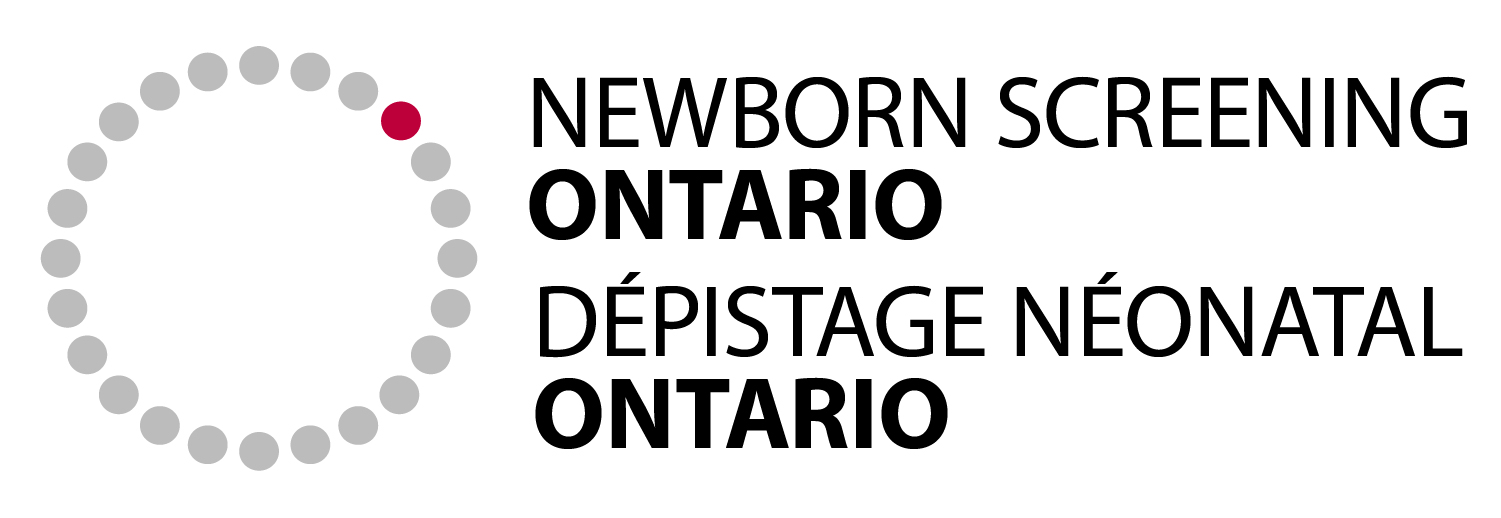- In Ontario, a heel prick is used to take a few drops of blood from each baby shortly after birth. The blood is tested for more than 25 treatable diseases, including galactosemia.
- A screen positive result means that more tests are needed to know whether a baby has galactosemia. It does not mean that a baby has galactosemia. Babies identified at a young age through screening can be treated early to help prevent health problems.
Galactosemia
At a glance
| Approximate incidence in Ontario: | Marker measured: | Screening can prevent: | Treatment: |
| 1 in 60,000 | Galactose-1-phosphate uridyl transferase (GALT) | Failure to thrive, liver damage, sepsis, death | Galactose restricted diet |
Galactosemia is a rare inherited (genetic) disease.
- Babies with galactosemia cannot break down galactose.
- Galactose is a type of sugar found in breast milk and many other foods.
Screening positive for galactosemia
- It is normal for parents and guardians to feel worried when their baby has a screen positive result. A ‘screen positive’ result does not mean that a baby has galactosemia. It means that there is a chance that the baby may have galactosemia.
- Follow-up testing is important to find out whether the baby truly has galactosemia. Babies with galactosemia are healthier if treatment begins early.
- The baby’s health care provider or a health care provider at a newborn screening regional treatment centre will discuss the results with the baby’s family.
- Follow-up testing is arranged as soon as possible and involves blood and sometimes urine tests.
- It can take a few days to weeks to find out if a baby truly has galactosemia or not. This waiting period can be hard for families.
Possible follow-up test results
- Normal – the baby does not have galactosemia.
- Abnormal – the baby does have galactosemia and will need treatment. The family will be supported by a team of caring specialists.
- Inconclusive – more testing is required. The baby will be followed closely by a specialist to ensure that he/she receives optimal care.
Although babies with galactosemia are normal at birth, they may develop serious health problems without treatment. Early signs of galactosemia usually appear within a few days to weeks after birth. They include:
- feeding problems (poor weight gain)
- diarrhea
- vomiting
- extreme sleepiness (lethargy)
- yellowish skin (jaundice)
- enlarged liver
Early treatment helps to prevent serious and life-threatening health problems such as:
- low blood sugar (hypoglycemia)
- liver damage
- cataracts
- serious complication of infections (sepsis)
- seizures
- problems with intellectual development
-
Treatment is started as early as possible and is lifelong.
- Treatment may involve a combination of:
- frequent feeding, especially when ill (babies with these diseases must not go a long time without food)
- a low protein diet and special medical foods
- vitamins and supplements such as vitamin B12 and carnitine, which are prescribed by a metabolic doctor
- antibiotics
- occasionally liver and kidney transplants are needed
- A team, including a metabolic doctor and a dietician, cares for babies with these diseases.
- Regular follow-up tests are used to monitor and adjust treatments.
- Babies with these diseases have their health and development checked regularly.
- If signs of a metabolic crisis (above) occur, urgent medical care must be found.
- When treatment starts early, there is a much better chance for normal growth, development, and intelligence.
- Although early treatment will ensure the best outcome, some children with galactosemia may still develop cataracts, speech problems, co-ordination problems, and intellectual difficulties.
If your baby has screened positive for GALT, click here for more information.
Contact Us
Children’s Hospital of Eastern Ontario
415 Smyth Road
Ottawa, Ontario K1H 8M8
Toll-Free: 1-877-627-8330
Local: (613) 738-3222
Fax: (613) 738-0853
